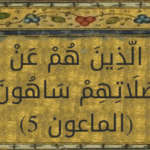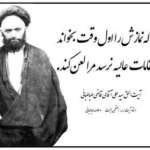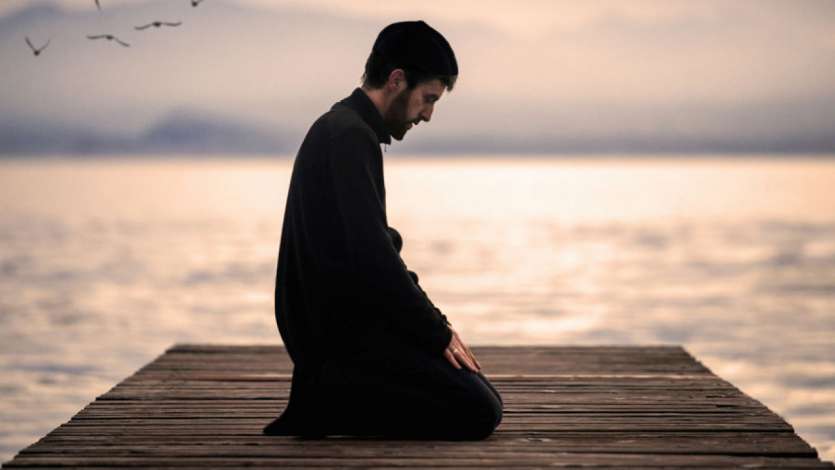It really is difficult to maintain our religious rituals and try to keep up with the best standards possible in obedience to Almighty Allah. We could say that when it comes to our daily prayers the test is real and never stops. It’s important to try to understand why we should pray on time and try to enthusiastically engage with it all the time.
I remember a very visual example made by Sheikh Muhsin Qara`ati on how important it is for us to pray on time and how praying can change from being something beautiful to something ugly.
Sheikh Qara`ati with his thousands of televised Quran lessons (in Farsi) is well-known for his parables and similes, attracting everyone to his charismatic approach.
 He once said that a beauty spot is beautiful in its right place, but move that spot to the middle of the face, right on the tip of the nose and it becomes an unwanted and ugly facial mole.
He once said that a beauty spot is beautiful in its right place, but move that spot to the middle of the face, right on the tip of the nose and it becomes an unwanted and ugly facial mole.
Our daily obligatory prayers are similar to this. It’s beauty is in it being performed in its right time, and the more delayed it is the less beauty it has.
Another example he gives is when someone says it’s their wedding day, they will pray later on.
He says: “Cigarette smokers smoke during engagements and weddings. Does your prayer not even have the value of a cigarette and the time it takes for a smoke? Wherever they go they give time to smoke. Whether you’re at a wedding or travelling, it only takes that much of your time.”
Your prayer needs to be prioritised. It needs to be a time you see to be pleasant and enjoyed. Not a burden and a heavy chore you just want to get rid of.
Do you know that when you pray, and on time, it creates a ripple effect, where you remind others of prayer time and the Muslims around you will realise their duty and turn towards God.
Yes, you are doing your wajib act if it’s within the time, but do you not aspire to get something out of the prayer?
Prayer is building a relationship with Almighty God, so the more effort you put the more meaningful it becomes and the stronger the relationship gets.
Even though we might trick ourselves into covering up our negligence by giving excuses or justifications, we know that we can do better.
A lot of times you might even hear yourself thinking “well at least I’m still praying,” “it’s not Qadha` yet,” “I just couldn’t ,” “I’m not doing haram,” and so on. ‘
You need to ask yourself what does Adhan do to you? Does it move you towards answering the call of prayer, or is it just another segment of the day, and you pursue your normal routine.
Shouldn’t the Adhan trigger something spiritual within you that reminds you it’s that time of the day to devote just a few minutes of your time to the Almighty. Won’t that empower you and give you the moral and mental strength you need for the rest of the day.
If the Prophet (s.a.w.) stopped everything, even battles, to pray on time, for sure you can take a few minutes off to benefit yourself.
You need to ask yourself where does Salat fit in with your daily schedule. Do you plan your day around prayer, or do you add it in where it suits you? Do you make the proper preparations to accommodate to your prayer, or does it happen when it happens and not when it doesn’t.
Our scholars say that if you want to get anywhere in this world in the spiritual and material side, pray on time.
The great contemporary mystic Seyid Baha` al-Dini said: If you want to receive abundant blessings pray on time.
The late Ayatullah Behjat in reply to someone who asked how they can increase their commitment to Imam al-Mahdi (may Allah hasten his reappearance) he said: Stay away from sin and pray on time.
Seyid Ali al-Qadhi, the spiritual teacher of Allamah Tabatabai had said: If someone was to pray on time and does not reach high spiritual levels they can curse me.
We have to turn it into a habit. A regular routine.
We kill old bad habits, and adopt new positive habits. Especially when it’s going to enlighten our souls and benefit us in this dunya and in akhirah.
What does it take to just prioritise and pray on time? It’s easy for you to delay your meal a bit, or ask for a lunch break, or stay in taharah to pray at the work site, or to think about prayer time before you make an appointment.
 If you wanted to find out who is religious and who cares for religion and faith, then see what they do when it’s prayer time.
If you wanted to find out who is religious and who cares for religion and faith, then see what they do when it’s prayer time.
The word Hayya, which means hasten is calling you to leave everything and come to prayer. This very word repeated six times in Adhan, and then another six times in Iqamah. The Almighty is invited you and asking you to turn to Him, even though He is of no need for anything.
You are being called 12 times, and you ignore?? How can you describe such a person?
God is asking you to hasten for prayer, but you show little or no concern. And when you want something from God, you expect there to be an instant answer!!
Benefits of Praying on Time (according to hadiths):
| In this world | At time of death | In Grave | In Resurrection | Crossing the Siraat | |
| 1. | Give you a longer life. | Save you from any fear. | Questions of Munkar and Nakir will be easy. | Your face will radiate and illuminate like the moon. | Allah will be content with you. |
| 2. | Increase in your money and wealth. | Protects you from the shock of death. | Barzakhi grave will be vastly expanded. | Your Book of Deeds will be in your right hand. | Greetings and salutations will be given to you. |
| 3. | Increases righteousness in your children. | Takes you to heaven. | A door to heaven will be opened. | Judgment will be easy. | Allah will shower His Mercy on you. |
[Taken from: Namaz Khubaan, Ahmad Pur-Tukkamani]
Never compromise your prayer for anything and always prioritise it.
Let’s have a look at some traditions that speak about praying on time:
The Prophet (s.a.w.) has said:
أحب الأعمال إلى الله الصلاة لوقتها.
The most loved of deeds according to Allah is prayer on time. [Mustadrak Safinah al-Bihar, vol. 83, p. 12]
The Prophet (s.a.w.) said on his death bed:
لا ينال شفاعتي من أخر الصلاة بعد وقتها.
Whoever delays their prayer from its time will not receive my intercession. [al-Mahasin, p. 79]
The Prophet (s.a.w.) has said:
لا ينال شفاعتي من استخف بصلاته لا يرد علي الحوض لا واللَّه.
Whoever is unmindful of their prayer will not receive my intercession, and by Allah will not meet me at the Pond. [al-Faqih, vol. 1, p. 206]
Imam al-Sadiq (a.s.) has said:
إن العبد إذا صلى الصلاة في وقتها وحافظ عليها وارتفعت بيضاء نقية تقول حفظتني حفظك اللَّه وإذا لم يصلها لوقتها ولم يحافظ عليها ارتفعت سوداء مظلمة تقول ضيعتني ضيعك اللَّه.
When a worshipper prays on time and prioritises it, they prayer will ascent white and pure, saying your protected me, may Allah protect you. However, when it is not prayed on time it will ascend black and dark, saying: you lost me, may Allah lose you. [al-Faqih, vol. 1, p. 209]
Imam al-Sadiq (a.s.) has said:
فضل الوقت الاول على الاخير كفضل الاخرة على الدنيا.
The virtue of praying at the beginning of time over delaying it is like the virtue of the hereafter over this world. [Thawab al-A’mal, p. 33]
Imam al-Sadiq (a.s.) has said:
امتَحِنوا شيعَتَنا عِندَ مَواقيتِ الصَّلاةِ كَيفَ مُحافَظَتُهُم عَلَيها.
Test our Shi’ah at times of prayer and how they uphold them. [Qurb al-Isnad, p. 78]
![]()


